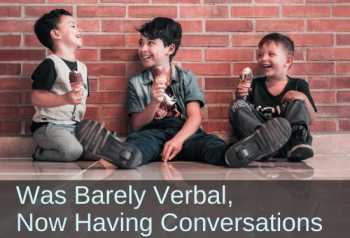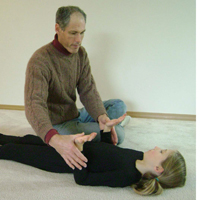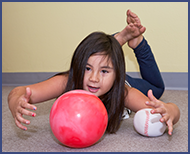4-yr-Old Boy — Not responding to Name, Becomes Able to Make Eye Contact, Learn, Sleep, Play
Submitted by Divya Jyothi, Teacher with Heartfulness Institute

|
Before
|
After
|
|
Trouble communicating; words would get stuck
|
Better able to use words for communication, even talkative
|
|
Messy handwriting
|
More flow to handwriting; words are straighter on the page
|
|
Would not try to draw
|
Now drawing recognizable pictures like cars and houses
|
|
Would scratch or hit if other children were not doing what he wanted
|
Can now talk to express what he wants; less frustrated when people can't understand him
|
|
Attention difficulties
|
Able to focus on games
|
|
Would get motion sick easily
|
Motion sickness almost completely disappeared
|
|
Would sleep very deeply but stay awake if wakened in the night
|
Wakes up in 2 or 3 calls and can go back to sleep within 5 minutes, which has resolved bedwetting issues
|
|
Could not learn more than one word or fact at a time
|
Now learns from whatever he watches or hears and is able to explain it what he has learned using his own words
|
My son did not respond to his name until he was almost 4. He was consulting a private speech therapist for 6 months at the age of 4 in the UK . He also saw an NHS speech therapist at school from time to time. I found very small change in his communication and socializing. Nobody was able to diagnose what problem he was facing. After moving to India, we met an occupational therapist in my son’s school. She explained to me about reflexes and suggested me to this [Brain and Sensory Foundations] course.
Challenges he was facing:
- He was not able to make eye contact.
- He was not able to move his eyes separately from his head.
- When he sat on the floor, his back was slumped and he rested his head on his knees.
- He had speech and language delay.
- He had difficulty expressing feelings. He was often misunderstood by others.
- He had problems with socializing. He wanted to be with friends but, couldn’t make any, so he felt disappointed most of the time.
- He put his hands over his ears in case of any weird or loud sound.
- He was having sleeping problems. He could not go to sleep easily, but once asleep he was a deep sleeper. If he woke up in the middle of sleep by chance. . .he would remain awake.
- He was bedwetting very often.
In school he always faced a problem with focusing, though he is a very fast learner and very good with his memory.
[After doing rhythmic movements, games, and reflex integration activities from the Brain and Sensory Foundations course for approximately 8 months*]:
Clients response and / or changes noticed:
- He was very comfortable and relaxed with rhythmic movements.
- Within a week of every day practice, he was better able to use words for communication, and he was less frustrated when people could not understand him.
- He has become a talkative boy sometimes which was a surprise for me. In the UK he did not talk much, just a few sentences. Then after some rhythmic movements, he started talking too much, but it was not relevant to the situation. Now he is able to carry on a relevant conversation.
- Within a couple of weeks of rhythmic movement practice, I saw change in his handwriting, colouring and drawing. He has more flow in his handwriting now. At first, each word slanted down on the page. Then his words became straight but the whole line slanted down on the page. Now his whole line is straight. His colouring is staying in the lines now. Before he would not try to draw. Now he is drawing recognizable pictures like cars or houses. He pictures even have the sky and clouds
- Slowly, as time passes by and practice continues, his emotional levels have improved. At first he was in his own world. He would laugh or cry but it didn’t relate to what was going on in the world. Now he is laughing and crying more appropriately. If he laughs, he is able to explain why, like he is thinking of some cartoon. There was a noticeable change in his confidence and he was happy most of the time.
- His social relationships have improved. At first he would scratch or hit if other children were not doing what he wanted. Now he can talk to them and try to convince them to do what he wants. Sometimes when his play has not gone well, he can talk to me about it and cry, which he was never able to do before.
- With continuous rhythmic movement and P.A.C.E practice, there has been a noticeable change in a few symptoms of FPR like fear in crowds, fear in groups of children, and sleep disorders.
- Drastic improvement in his self-awareness. At first he did not respond to his name. I had to teach him who was P----, who was Mommy and who was Daddy. He could then point to the right person, but he called himself P---. Now he uses “me” to refer to himself. That helped him in understanding and expressing his feelings. Before he did not know when he was hungry or tired, now he can tell me, and he can choose what to eat.
- Lazy appearance and difficulty moving fluidly. At first when he woke up, he would just sit on the couch and not move. If I asked him to come, he would move very slowly. He still does this to some extent but he is better.
- His attention span has improved. He is able to focus on games for quite a long period of time. He still has some trouble staying on task at school.
- His motion sickness almost completely disappeared.
- His sleeping difficulties disappeared. He will sleep within 15 to 30 mins of going to bed.
- His bedwetting is almost gone. If I try to wake him up in the middle of the night, he wakes up in 2 or 3 calls and can go back to sleep within 5 minutes.
- He has become a self-learner. At first I could teach him one word or fact at a time, but he could not generalize the learning at all. Now he learns from whatever he watches or hears and is able to explain it to me using his own words.
- Although there is a lot of improvement in his speech, he still has a noticeable difficulty with the flow. His words still get stuck sometimes.
- During free play, he has started narrating stories to his sister. Both will be doing role-play
- Going to beach driving car and stopping on the way pretend they are tired.
- Spinning around pretending to be helicopters – First couple of times he was getting tired and felt motion sickness, he never stopped as he was with his sister’s company. He is completely fine now with spinning.
- Pretend swimming in a pool imagining a hot day. - There is a lot of noticeable positive changes in him. He is a happy and confident kid now which makes all of us very happy and relieved. We are really fortunate that we came to know about these integration movements. All these integration activities and movements have become a daily routine to him, He has become self-aware. As a result, with a very few reminders he will be conscious and get back to himself without getting lost in dreams which helps him in school.
[Edited, emphasis added. Note: Mother utilized these movements with her son from August 2019 to April, 2020.]


